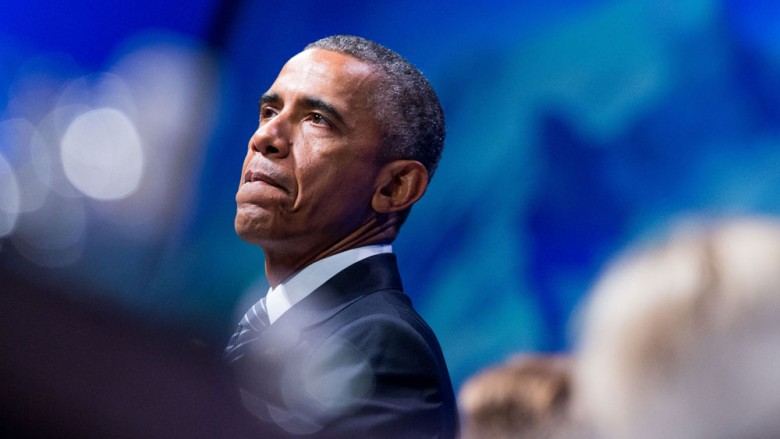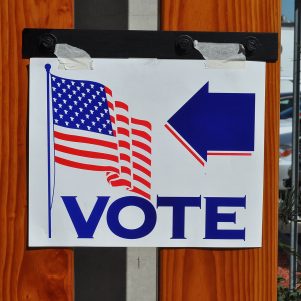The Iran deal: bad for Israel, bad for America, bad for democracy
By NBP Editorial Board | September 4, 2015, 7:23 EDT
 President Barack Obama speaks at the Global Leadership in the Arctic: Cooperation, Innovation, Engagement and Resilience (GLACIER) Conference at Dena’ina Civic and Convention Center in Anchorage, Alaska, Monday, Aug. 31, 2015. (AP Photo/Andrew Harnik)
President Barack Obama speaks at the Global Leadership in the Arctic: Cooperation, Innovation, Engagement and Resilience (GLACIER) Conference at Dena’ina Civic and Convention Center in Anchorage, Alaska, Monday, Aug. 31, 2015. (AP Photo/Andrew Harnik) With the announcement Wednesday by Senator Barbara Mikulski (D-Md.) that she will support the administration’s nuclear agreement with Iran, President Obama now has enough votes to ensure that his unsound deal will go forward.
But before he takes that victory lap, President Obama would be wise to consider that a majority of Americans (56 percent, according to a CNN poll) remain opposed to the deal.
And with good reason.
— The agreement does not prevent Iran from acquiring a nuclear weapon. Although the administration claims that the agreement is the only way to prevent a nuclear Iran, the American people understand that there is nothing in the agreement that prevents Tehran from acquiring nukes.
At best, the deal slows down the process, in the hope that some future democratic Iranian government will see the error of their ways and abandon the nuclear enterprise. This, of course, assumes compliance, which is by no means certain. (More on that below). If, as many experts believe, Iran has no intention of complying with the deal, then the deal arguably speeds up the nuclear timeline by giving Iran access to technologies and materials that make the creation of a nuclear bomb possible. As such, it encourages a regional arms race, as other countries in the region seek to acquire the same capabilities in order to deter Iran.
— Iran is the leading state sponsor of terrorism. But rather than discourage Iran from supporting terrorism, the deal actually allows Tehran to increase it’s funding of violent jihad by releasing $150 billion in capital, currently frozen in overseas accounts, and by allowing Iran access to billions of dollars when oil sanctions are lifted.
Sec. of State John F. Kerry acknowledges that the deal does nothing to curb Iran’s “destabilizing activities” (read, support for terrorism). So do Massachusetts Senators Elizabeth Warren and Ed Markey. In early August, Warren admitted that that Iran “undermines international peace and stability.” For his part, Markey released a statement conceding that “[Iran] is a state sponsor of terrorism, a destabilizing force in the Middle East, and with nuclear weapons capabilities Iran would present an existential threat to Israel.” Yet, shockingly, they have convinced themselves that these are separate concerns with no bearing on whether we should lift sanctions and allow Iran access to billions of dollars and the technology necessary to create a nuclear weapon.
Kerry attempts to placate concerns for the security of our Middle East allies with a promise to increase U.S. military and financial support for Israel, Saudi Arabia, and other U.S. allies in the Gulf. But his promise to protect our friends in the region with money and conventional weapons is meaningless if Tehran acquires a nuclear bomb.
— The inspection process lacks credibility. Iran has a history of cheating on international agreements, and this agreement provides no real mechanism for ensuring compliance. Under the deal, Iran has the power to delay inspections, giving them time to hide evidence of their nuclear activity. What’s more, under the terms of secret side deals that the administration had not intended to disclose to Congress, Iran is allowed to collect its own samples for the International Atomic Energy Commission. No wonder nearly 200 generals and admirals from all five branches of the military last month sent a letter to Congress asking lawmakers to reject the deal because “there is no credibility within [the] inspection process.”
A poll conducted by Democratic pollster Pat Caddell for a group that opposes the deal found that the more Americans know about the deal, the less they support it. For example, when told that the deal does not provide for independent monitoring of Iran’s military laboratories by U.S. or Canadian inspectors, 67 percent of voters said they disapproved of a deal; 64 percent said they believe that the President and Secretary of State have misled the public about the deal.
Put simply, most Americans view the deal as an attempt to appease Iran. And so does a majority of Congress.
But Obama has done a constitutional end-run around Congress by designating the deal as an Executive Agreement — as opposed to a treaty, which would require approval by two-thirds of the Senate. Although Congress may yet vote for a resolution “disapproving” of the deal later this month, Mikulski’s 34th vote gives the President enough Democratic support to uphold his veto, meaning that the deal will go into effect.
That’s bad news for anyone who is against nuclear proliferation. But it’s also bad news for democracy.
Other NewBostonPost editorials:
Important tests ahead for Mass. education reform
On ‘sanctuary cities,’ local governments should not flout federal law









